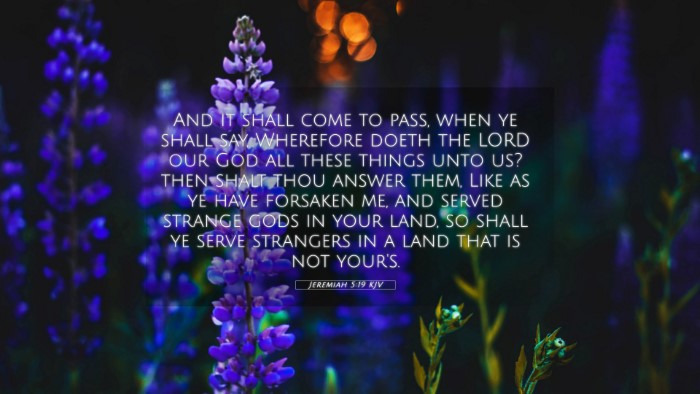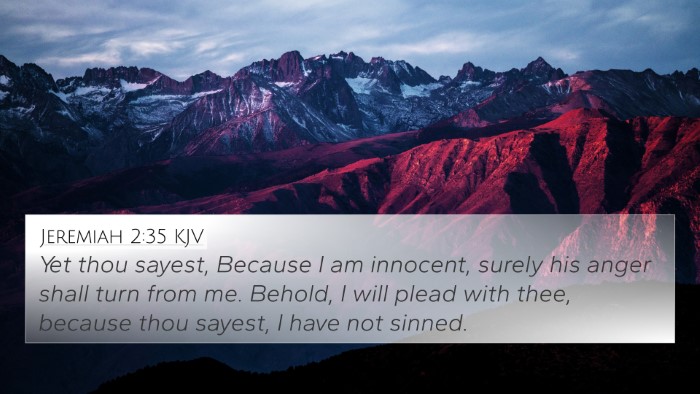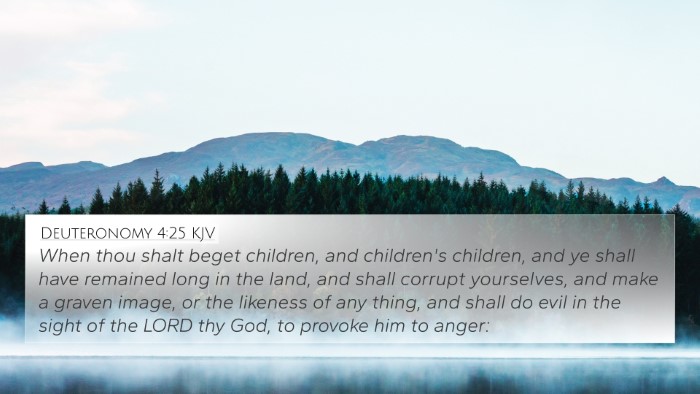Bible Verse Meaning of Jeremiah 5:19
Verse: "And it shall come to pass, when ye shall say, Wherefore doeth the LORD our God all these things unto us? Then shalt thou answer them, Like as ye have forsaken me, and served strange gods in your land, so shall ye serve strangers in a land that is not yours."
Summary of Jeremiah 5:19
This verse highlights a divine response to the people of Judah's questioning of God's justice. They inquire why God allows them to suffer, and the answer points to their own unfaithfulness and idolatry. The verse serves as a reflection on the consequences of abandoning God and serving idols, emphasizing that the hardships they endure are a direct result of their spiritual disloyalty.
Insights from Public Domain Commentaries
Matthew Henry's Commentary
Matthew Henry illuminates this verse by explaining that the Israelites are warned about the repercussions of their actions: forsaking God results in severe consequences. He emphasizes the importance of repentance and returning to God, for their troubles arise from their rebellion and attachment to foreign gods.
Albert Barnes' Notes on the Bible
According to Barnes, this verse underscores the idea that the Israelites will come to a profound realization of their situation. When they question God's actions, they are reminded that their suffering is linked to their idolatry and abandonment of their covenant with God. He emphasizes that the answer to their lament is rooted in their own historical failures.
Adam Clarke's Commentary
Adam Clarke elaborates on the idea that the Israelites' questions reveal their lack of understanding of the covenant relationship with God. His commentary notes that the phrase "serve strangers" indicates that as they forsake God, they will face oppression and servitude in foreign lands, symbolizing their spiritual exile and loss of divine favor.
Understanding the Context
The historical and cultural context of Jeremiah 5:19 involves a period of great moral decline and idolatry in Israel. The prophet Jeremiah warns the people of the consequences of their actions. This verse serves as a poignant reminder that turning away from God leads to severe ramifications, including spiritual desolation and physical suffering.
Cross References
Jeremiah 5:19 links to numerous other Biblical passages that deepen our understanding of its themes:
- Deuteronomy 28:47-48: Discusses the consequences of not serving God with joy.
- Jeremiah 2:13: Speaks of God as the fountain of living waters, which they forsook.
- Hosea 8:3: Addresses Israel's rejection of good and their consequences.
- Isaiah 42:25: Indicates the consequence of turning away from God.
- Ezekiel 14:6: Call to repentance from idols and return to the living God.
- Galatians 6:7: Reaping what one sows, linking actions with consequences.
- Romans 1:21-23: Describes how they exchanged the truth of God for lies and the consequences thereof.
Thematic Connections
Jeremiah 5:19 can be thematically connected to several key biblical concepts:
- The Concept of Repentance: The necessity for God's people to turn back from their ways.
- The Faithfulness of God: Despite human unfaithfulness, God remains constant in His justice.
- The Consequence of Idolatry: The connection between spiritual fidelity and divine blessings.
- The Historical Narrative of Israel: The cyclical pattern of sin, judgment, and restoration present throughout the Scriptures.
Conclusion: Reflection on Jeremiah 5:19
Jeremiah 5:19 serves as an admonition for those who wander away from the faith. It challenges believers to consider their relationship with God and the implications of their actions. By cross-referencing this verse with associated scriptures, individuals can gain a deeper understanding of God's character, the effects of sin, and the importance of maintaining a faithful relationship with the Divine. The message resonates throughout the Bible, encouraging continuous reflection and commitment to the path of righteousness.














